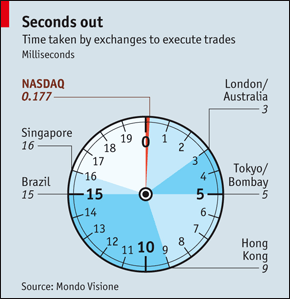|
Dr. P.V. Viswanath |
| Home/Courses/Articles | ||
High-frequency tradersThe Economist, Aug. 12 ,2010 |
||
THE merits of high-frequency trading (HFT) are under scrutiny in America, thanks to the “flash crash” of May 6th when the Dow Jones Industrial Average plunged by nearly 1,000 points in a matter of minutes. But high-speed traders are getting a warm welcome in emerging markets. When BM&FBovespa, Brazil’s main exchange, offered firms “co-location” slots to place their trading machines in the exchange’s data centre in February (giving them an additional edge on speed), they quickly sold out. The exchange plans to double the number of slots to meet demand. On Singapore’s exchange, the share of derivatives trades accounted for by HFT has risen from 10% to 30% in two years.

Satisfying the technical needs of these speed merchants is hard. High-frequency traders execute thousands of trades a second. Exchanges are required to process trades in microseconds (millionths of a second). They also need to increase the speed with which traders receive market data to feed into their algorithms. These upgrades are expensive. Singapore Exchange’s plan to build one of the fastest platforms in the world, capable of executing trades in just 90 microseconds, will cost an estimated S$250m ($185m). NASDAQ’s system is currently the fastest with trade times of 177 microseconds (see chart). For the traders themselves, expansion abroad makes sense. HFT uses automated strategies to capitalise on inefficient pricing of financial instruments at blinding speed. As markets in America and Europe have become more competitive—HFT now makes up over 60% of equity trades in America and nearly 50% of British transactions—bid-ask spreads have narrowed and arbitrage opportunities exist for ever-briefer periods. In newer markets traders can use simpler algorithms for higher yields. Expansion is also cheap. Herbie Skeete of Mondo Visione, an exchanges consultancy, points out that most HFT firms have already incurred the fixed costs of developing their proprietary-trading platforms. Adapting these systems for other markets is not very expensive. Even if the size of transactions is lower than on American markets, the high turnover can generate healthy profits. Exchanges are also keen to court HFT firms. Long used to operating as monopolies, bourses in Asia and Latin America now face competition from alternative trading platforms. Chew Sutat of Singapore Exchange says that HFT increases trading volumes, improves market liquidity and lowers trading costs. That leads to a more efficient price-discovery process and attracts more investors. There are hurdles to the spread of HFT, however. Emerging-market governments are wary of encouraging short-term foreign investors. HFT firms which seek to exploit currency movements or arbitrage price differences between local-currency and foreign-currency bonds want to move funds in and out of a country with minimal friction. The presence of capital controls makes this hard. Brazil’s 2% tax on foreign equity and debt investments in 2009 did not deter existing HFT firms but did discourage new ones. Exchanges in Asia and Latin America are also keen not to alienate retail and institutional investors. Some investors fret that co-location creates a two-tiered system by favouring firms with machines closer to an exchange’s data hub. Others worry that HFT increases volatility and systemic risk. To keep these customers satisfied, speed may not be of the essence. |
||
Questions:
|